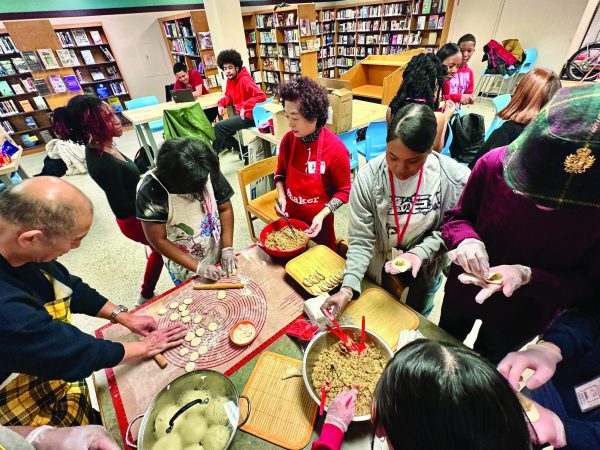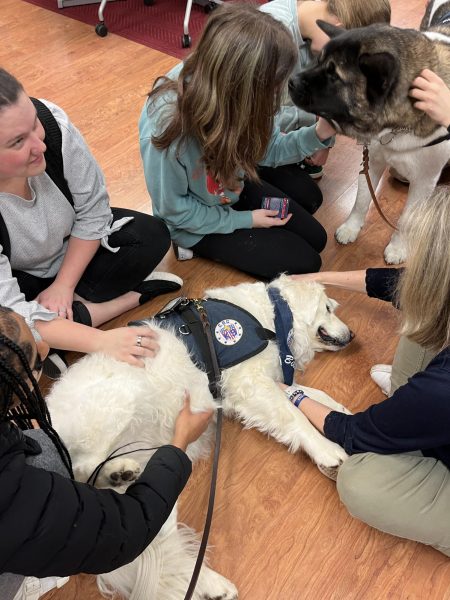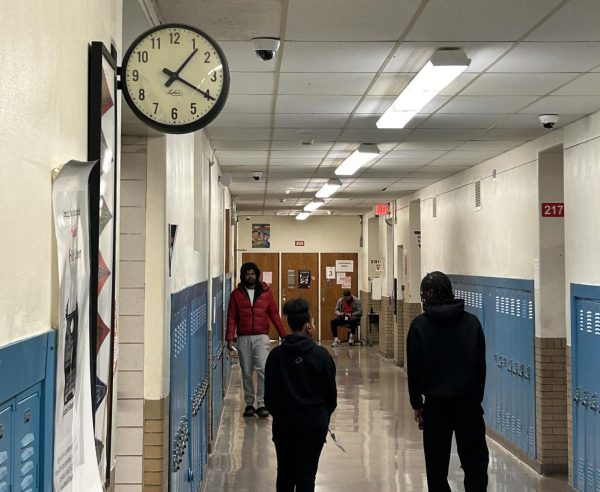Wiemer Brings the World To Her Classroom
Biologist turned teacher shares lively stories from the field
She’s tagged birds of paradise in New Guinea. She’s ridden horseback on the beaches of the Dominican Republic. She’s caught massive pythons in Costa Rica. She’s survived alone in the wilderness for two weeks.
Sound like Indiana Jones? For Biology and Environmental Systems & Societies teacher Jeanne Wiemer, adventures like these are just the beginning of her anything-but-ordinary life.
A former field biologist, Wiemer is currently teaching one of the high school’s newest classes, Environmental Systems & Societies. Her time spent in the field uniquely informs the class. One minute Wiemer will be lecturing the class on biodiversity, and the next she’s showing her students scars she received from a Green Vine snake in Costa Rica. These anecdotes that tie back to the course come from years of field experience. “Before I was a teacher I was a field biologist, I worked in the Ichthyology department at John Carroll. I did research on the Northern Creek Chub,” said Wiemer.
For part of her training to become a field biologist, Wiemer channeled her inner “Hunger Games” contestant and survived in the woods on her own for two weeks. “You get a tarp, a knife, some rope and flint, and you’re hungry all the time! First thing, you set up shelter and fire,” said Wiemer. “Anybody who wants to be a wildlife biologist has to go through that training.”
As a researcher, Wiemer has witnessed firsthand how quickly people are destroying the environment and suppressing biodiversity. “I knew the area, and where we were headed to check on the birds, when all of a sudden we turned the corner and saw the same tree for miles and miles, as long as we could see. It’s sad to see that kind of stuff happening. We saw a drastic reduction in the birds of paradise,” Wiemer said.
Senior and former ESS student Beth Cheverine appreciated Wiemer’s field biologist perspective. “Mrs. Wiemer’s real-life experience as a field biologist is a very unique trait. She could share her own personal experiences which was beneficial to our learning. She could relate the material to real life applications, which is always helpful to students,” Cheverine said. “My favorite story of hers would have to be when she was trapped in a research station in Alaska for three days because a polar bear was outside. It’s unbelievable!”
Over the past two years, ESS has become a popular class for juniors and seniors to take. “I think it’s going well! It’s a fun class, I enjoy teaching it, and I think students enjoy taking it. It applies to everyday life, a lot more than other classes do,” said Wiemer.
Cheverine had nothing but praise for Wiemer and the ESS course. “My favorite thing about having Mrs. Wiemer as a teacher was how comfortable I felt in her class. We often got off-topic, but the off-topic conversations were where we learned the most. Mrs. Wiemer is very open, but not too open, and she did a great job of connecting what we learned to real life and to examples we can relate to. She treats her students with a lot of respect and she is able to relate to us, and she was always professional while still being honest. She never judged her students for their questions. Her extensive knowledge was extremely impressive,” said Cheverine.
In some cases, Wiemer’s ESS students have internalized the troubling environmental problems they’re learning about. “This one student I have, his family used to use paper plates for dinner. He came up to me in class one day and said that his family no longer uses paper plates,” said Wiemer. “It’s a good result! Every little bit helps. I hope that being aware of stuff makes people more conscious about recycling,” said Wiemer. “However, it’s not about guilt!”she laughed. “I’m not up here telling my kids, ‘Recycle or die’!”
In class, Wiemer’s most intriguing stories often become popular with students. Any ESS student is of course familiar with Wiemer’s farm. “I live on a ten and a half acre farm. I have an apple orchard with eight apple trees, two pear trees,” said Wiemer, who makes cider, canned apples, and pies from her plentiful orchard, and has brought in bushels of apples for her students. “My husband hunts, he hunts deer, rabbit, turkey and pheasant, which we then eat. Also, I have animals, like chickens, and we get fresh eggs everyday. I have horses and two dogs and three cats. My husband always says we should get a zebra and I always tell him no!” laughed Wiemer. Students get a kick out of hearing how Wiemer travels to her nearest neighbors’ homes on horseback when she needs to ask a quick question.
Wiemer’s love for the environment began at an early age and continues to be a huge part of her life. “My grandmother was a microbiologist, one of the few women who were back then. She always took us on creek walks, and for my fifth birthday, my favorite present was a microscope,” said Wiemer. However, Wiemer wasn’t always certain how she wanted to utilize her love for the environment as a career. “Originally I went to school to be a vet. I worked as a vet tech for several years in college. The turning point came for me when I had to put down a horse and a cat in the same day. It’s one of those positions where you have to do what your job entails you to do, and I couldn’t do it. I did not enjoy that.”
Possibly one of the best indicators of Wiemer’s unique life is all of the nontraditional types of meat she’s eaten. “The one that creeps everyone out is monkey brains!” said Wiemer. “It was part of a ceremony, and I couldn’t reject the tribe’s culture. It would be the rudest thing ever. There are a lot of researchers who have been killed by indigenous people because of their disrespect.” From crocodiles to squirrels to exotic birds, the foods Wiemer has eaten have as much variety as the countries she’s traveled to. Her diverse, extraordinary experiences bring the world into the classroom for ESS students.
Though she seems to have settled down for the time being, with as much passion for the outdoors as Wiemer has, one gets the sense her days of adventuring may not be over just yet.
A version of this article appeared in print on 19 September 2013, on pages 16 and 17 of The Shakerite.





